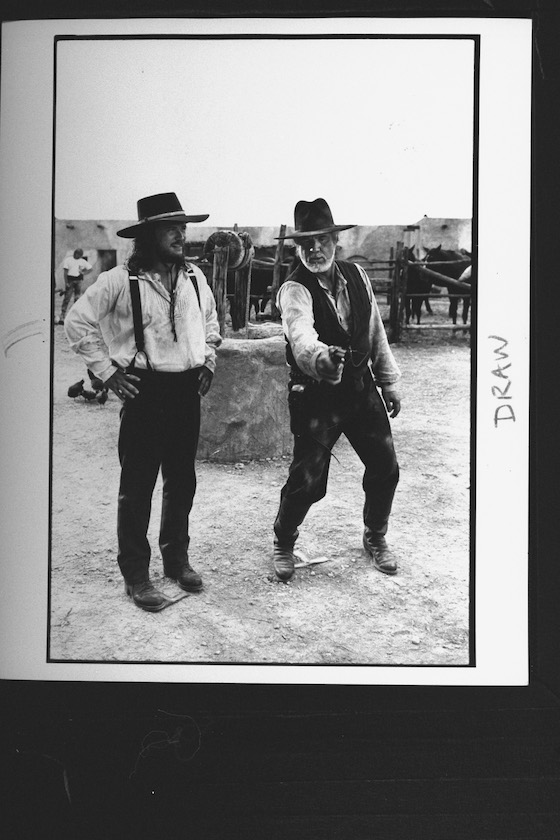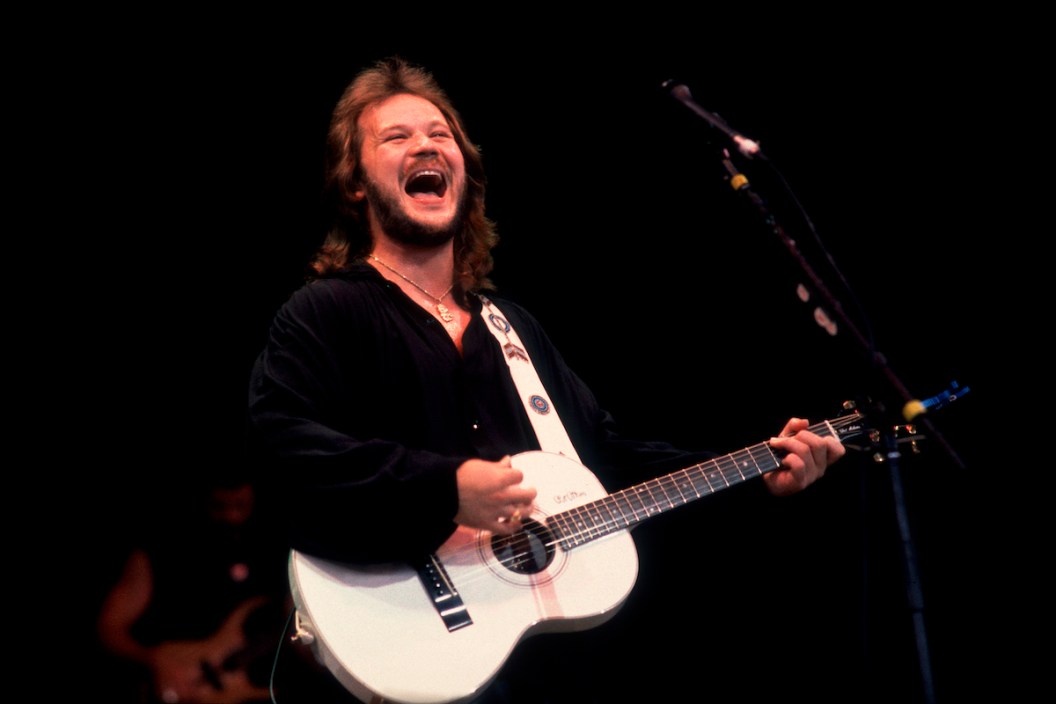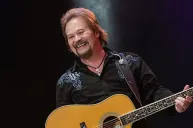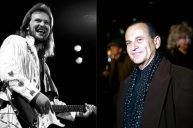[dropcap]B[/dropcap]ack in the 1990s, CMT and TNN's rotations of music videos proved to be invaluable for country stars amid rising CD and concert ticket sales. Indeed, the format helped shape a prosperous time in country music by adding both a face and fashion sense to the suddenly ubiquitous voices of John Michael Montgomery, Shania Twain and others associated with the decade.
To set himself apart from an influx of peers making visually-stunning videos that often amounted to over-the-top recreations of their live presentations, Travis Tritt did what a songwriter should do: he told better stories than anyone else in a crowded and competitive marketplace. He accomplished this with a trilogy of videos that follows the heartbreaks and triumphs of a military veteran named Mac Singleton.
The Singleton story begins in the music video for "Anymore," a chart-topper from the 1991 album It's All About to Change. Tritt penned the second of his five No. 1 singles with Jill Colucci (co-writer of prior Tritt hit "I'm Gonna Be Somebody"). One of the most emotionally-provocative music videos of its time promoted a song from a pivotal stretch of Tritt's career, as "Anymore" impacted the charts in between "Here's a Quarter (Call Someone Who Cares)" and Marty Stuart collaboration "The Whiskey Ain't Workin'."
"Anymore's" music video garnered enough positive response for a sequel, shot for the 1995 single "Tell Me I Was Dreaming." Sustained public demand turned a two-parter into a trilogy that nearly spanned the '90s when the official music video for 1998's "If I Lost You" ended a roller coaster of emotions on a positive note.
Read on for Wide Open Country's deep dive with Tritt into three music videos that still influence his big- and small-screen ambitions.
(This interview has been edited for length and clarity.)
Wide Open Country: This is a chicken or the egg question, but with the videos being spread out from '91 to '95 and '98, did you know in '91 that there was going to be a trilogy?
Tritt: I had no clue. As a matter of fact, the song "Anymore," the one that was the first of the trilogy, I didn't even want to do a video for that particular song. We had done videos on practically every single that I had released up to that point, and I told my record label [Warner Bros.] that I just felt that the song was so self explanatory that it just didn't need a video. They were adamant in the other direction. They really wanted to do a video for it.
So, I basically came to a compromise with them. I said, "Look, here's the deal. If you come up with a treatment or a script for a video that just knocks my socks off, then we'll do it. Otherwise, let's just skip this one." It was several weeks, maybe months later. I was in Orlando, Fla. playing some shows, and I was getting ready to go to dinner one night. As I was walking by the front desk, they said, "Oh, we have a FedEx for you." I just grabbed it as I was on my way out, and I got to dinner a little bit early. So, I'm sitting at a table by myself, and I just open this FedEx. It's the script, the treatment that [prominent music video director] Jack Cole had come up with for "Anymore."
I'm sitting there at the table, and as I'm reading through this script, it's literally bringing me to tears. I'm just blown away by it. I could see the imagery that he was trying to create and the story he was trying to tell, which was very, very strong. I immediately right then and there agreed to do the video.
That was at a time, too, when not a lot of people were doing mini-movies with their videos. I think maybe Garth Brooks had done it, and there might've been one or two others in country music. But very few people had done that sort of thing at that particular time. It was different, and the story was extremely strong.
Then they told me that not only did they want me to play this part of a disabled American veteran, but that they wanted to shoot the video in an actual veteran's clinic down in Murfreesboro, Tenn. and everybody in the video except myself and three or four other actors on that shoot would be actual veterans that either were patients or staff members at this veteran's hospital. That was just very intriguing to me, so that's what got it started.
Wide Open Country: Your co-star in all three videos, Barry Scott, was a seasoned actor, Nashville native, playwright and voiceover actor. Do you know how he got cast as Al?
Tritt: I have no idea how he was cast originally. Jack Cole did all of the original casting and everything for that first video. But Barry and I hit it off right off the bat.
We realized something else very early on. Anytime you're telling a story, whether it's in a movie or a video or in a book or even in a song, the best way to increase the popularity of that is to create characters that people actually care about. We realized very early on that Jack Cole had created characters in this video that people were going to care about. We didn't know how much they were going to care about them, and that turned out to be somewhat surprising to all of us. But we knew that it was going to be a touching story, and these were all going to be characters that were definitely going to have an impact on people once they watched it.
Wide Open Country: Have people over the years and certainly back then came up to you —veterans in particular— and complemented the video and said what it meant to them to feel represented?
Tritt: Yes. Well, first of all, when we shot the video, it was a tremendous experience for me because I tell my audience every night that I've known all of my life that there's basically only two things that protect us in this country from our enemies, and that's almighty God and our United States military. I had known a lot of people that had served, but I didn't know a lot of combat veterans before we started shooting that video.
Over the course of shooting that video, in between shoots and setting up shots, I had a chance to spend a tremendous amount of time with all of these veterans. They were from a bunch of different wars, with some of them going back to World War II. They just told me amazing stories about battles they had fought in and wars they'd been part of. The most impressive thing I heard was every one of those warriors, no matter how badly they were injured, they told me that if they had a chance, they'd do it all over again in a heartbeat. That's how much they loved their country and how much they loved the people in it. That just moved me, and I knew I had formed a really special bond with all of these folks at the video shoot.
What we decided to do is a few weeks later when the video was finished in the editing room, we brought it back to that same veteran's clinic and debuted it in front of all of the people that had been in it. I was sitting on the stage next to the screen, and I'm just looking out in the audience. I saw so many tears, I saw so much emotion, and I just thought this is something really special right here.
As soon as I got home from that debut, I got on the phone and started calling all of my senators and my congresspeople in Georgia and basically said, "Look, I know I'm just a country music singer, and there may not be a lot I can do. If there's any way I can use my talent or my platform or my notoriety or my music or whatever to draw more attention to veterans and veterans issues in our country, I'd like to volunteer for that and see if there's something I can do." As a result, I had the wonderful honor and privilege of being able to serve as the celebrity chairman and celebrity spokesperson for the DAV, the Disabled American Veterans, for four years in a row. After that four years was over, I had the opportunity to serve in that same capacity for two more years with the VFW, the Veterans of Foreign Wars.
Not only did I get a chance to travel all over the United States and perform for and shake hands with and talk with all of these heroes. I had a chance to do that all over the world. Everywhere I went, it was a very, very special thing. It bonded me with veterans at that point, and that continues to this day.

Mark Perlstein/Getty Images
Wide Open Country: One thing that sticks out about the "Anymore" video in particular is that you really had to act. You had a speaking role in a dramatic story. It wasn't just you pantomiming with a guitar, like a lot of music videos still are. Did you have acting experience going into that?
Tritt: I had no acting experience prior to going into that, but I'll tell you what the result of that was. A few months after that video debuted, I get a call from my manager who also was managing Kenny Rogers. Ken Kragen was his name. He starts telling me about this script that CBS wanted Kenny to do. It's the only western he would have done for them that was not part of the Gambler series.
They sent me a script for a movie called Rio Diablo. CBS didn't really want me because I didn't have any acting experience. I was a novice in that regard. Kenny really went to bat for me as a result of seeing that video. He said, "Listen, I'm telling you guys right now. Travis has more natural acting ability than I had when I first got started." So, he threw down an ultimatum and basically told CBS... He said, "Look, if you don't bring him in for this part, I'm just not going to do the movie, either." It was the thing that launched my ability to be able to do some of these acting roles in a bunch of different things for film and television.
Wide Open Country: What made "Tell Me I Was Dreaming" the right song to continue the Mac Singleton story?
Tritt: We had gotten so much mail and so many responses from people that really cared about those characters. Like I said, we knew we'd told a great story, but we didn't realize how much people would be affected by it. Basically, that was by audience demand.
So, I had this song that I had written with Bruce Ray Brown called "Tell Me I Was Dreaming." We sent it to several different directors, but we sent it to Michael Merriman. I basically told him that if we can find a way to continue this story that we started in "Anymore" and you can find a way to use this song to do it, that's what I would love to do. He came up with the entire script for "Tell Me I Was Dreaming," which was extremely strong, as well. As you know, there's so many things that take place, and there's shocking things. It really leaves you once again being touched by these characters that people cared about so much.
Wide Open Country: At this point, you went from making a video with no prior acting experience to having had some other opportunities in between. Did that make it easier to continue the story?
Tritt: I felt a little bit more comfortable, but once again, the thing I always enjoyed about the acting and have ever since is that it takes me so far out of my element in music that I not only learn my lines. I learn the whole script, and it just gives me that confidence to be able to go out of my comfort zone and attempt something like that. While I had had a little bit more experience at that point, it was a challenge. But it was a challenge I accepted greatly because every time that I've done any acting, I find that it takes me so much out of my comfort zone and so much out of my element that when I come back to the music, I think I write better songs. I think I'm much more creative like it's brand new to me because I've been so far out of my element for however many weeks or months it takes to film a movie.
Wide Open Country: While making "Tell Me I Was Dreaming," was it known at that point that there would be a trilogy, or was that decided a little later?
Tritt: No, we really thought the story was going to end there. Once again, by popular demand, we had so many people asking, "Well, what happened to those characters now?" I had written a song called "If I Lost You," and once again, we sent it to Michael Merriman. I can't remember if it was his idea. I think it was. I don't think I was planning on continuing the story. I think Michael came up with the idea of continuing the story in "If I Lost You," and he wrote the entire script, the entire treatment for that, as well.
We get to show my child a little bit older, and of course I'm a little bit older. All of the characters are a little bit older. We've moved on in our lives, and we've transitioned to a different place. I thought it was very, very touching and very moving.
Wide Open Country: The "If I Lost You" video is no less dramatic but a little bit more feel good. No one dies in it. There's the hope of the daughter growing up. We're reminded that her birthday is her mother's death day, but there's some comfort in that, as well. Was it fulfilling to end the trilogy on a bit more of a positive note?
Tritt: Absolutely it was. The cool thing that Michael Merriman did in that video is he still created drama. There's the scene where I get on the pontoon boat and then my daughter gets on the pontoon boat, and then Al says, "I'm going to let you go out today. I'm not going to go out with you guys today. I think you need to spend some time with your old man." As the boat pulls off the dock, there is a shot of Al standing there alone, and I can't tell you how many people told me as they were watching it for the first time, they said, "Oh my God, Al's going to die."
I thought that was brilliant on Michael's part. The way that he shot that scene and the way that he set that scene up, it creates that drama. Once again, I have to give all the credit to him for that. I thank both Jack Cole and Michael Merriman for putting all of the different stories together and making them so strong and creating characters, once again, that people cared about.
Wide Open Country: Anything else about the trilogy?
Tritt: Nothing other than I will tell you that when the trilogy was finished and we had so many positive responses to it, I actually went to Hollywood and pitched that trilogy as a possible movie, either for television or for a motion picture. I got a lot of interest in it, but the only thing that I heard from all of these studio heads is they were concerned because that was right in the middle of we'd been through the Gulf War and all of those different things were going on. I think the studio heads were concerned that people were war weary at that point and they didn't want to delve into anything that had to do with war.
I thought then and still think now that that story could make a great television movie or possibly a feature film at some point. I just think it's great characters and great, great storylines and, once again, characters that people care about.




